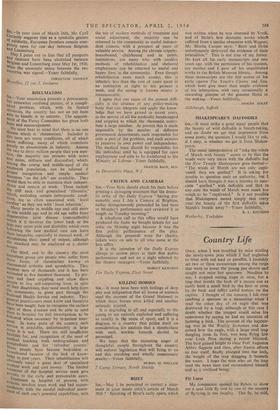RHEUMATISM
Sni,---Your annotation presents a provocative, but somewhat confused picture, of a compli- cated problem, which, with its limited resources, the country has not as yet been able to handle in its entirety. The appoint- ment of the Piercy Committee has given both
Pe and encouragement.
',We must bear in mind that there is no one sense which is ' rheumatism.' Included in is term are many conditions, all of which use suffering, many of which contribute
. really to absenteeism in industry. Among
the two to three million people that you men- tion, the majority are persons with aches and pains, stiffness and discomfort, which, among the young and middle-aged of the employed population, can be relieved if proper recognition and simple medical measures ' on the job' are available. They Would then he able to maintain their indepen- d,enee and remain at work. These include the stiff neck and generalised ' fibrositis,' which, excluding certain orthopaedic condi- ,"Ms, are as often associated with ' focal conflict' as they are with ' focal infection.' ,, Many people in middle age and still more In late middle age and in old age suffer from degenerative joint disease (osteoarthritis) which if it involves the lower back or the hips may cause pain and disability which even following the best medical care can leave them incapable, especially in manual work, of maintaining their speed of output, although the standard may be unaltered at a slower tempo.
the use of modern methods of treatment and social adjustment, the majority can he returned to the community as useful indepen- dent citizens, with a prospect of years of valuable service. Among the chronic cripples, housebound, chairbound and in public institutions, are many who with modern methods of rehabilitation and sheltered employment can be returned to useful and happy lives in the community. Even though rehabilitation costs much money, this is infinitely less than the cost of years spent in an institution at eight to ten guineas a week, and the saving in human misery is immeasurable.
I agree that one cause of the present diffi- culty is the absence of any policy-making body that can integrate and apply the know- ledge that we have gained in recent years, in the service of all the medically handicapped and crippled to which the rheumatic contri- bute a large number. At present this is made impossible by the number of different government departments, each responsible for only a part of the problem, and each anxious to preserve its own power and independence. The medical team should be responsible for the individual until he is equipped for open employment and able to be transferred to the Ministry of Labour—Yours faithfully,
la Devonshire Place, W.1
FRANCIS BACH, M.D.


















































 Previous page
Previous page